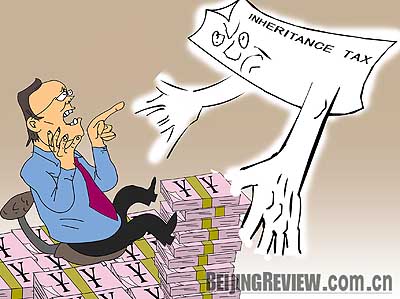|

After the snow disaster in south China and the massive earthquake in Sichuan Province in the first half of 2008, the nation showed its support by donating almost 100 billion yuan ($14.3 billion). This has prompted a chorus of voices advocating the introduction of the inheritance tax, which is said to encourage businesspeople to donate rather than perpetuate wealth by keeping it in the family stream.
A recent article in Securities Daily also suggests that China adopt the inheritance tax immediately, in order to expand consumer spending.
Chinese people traditionally have the habit of saving. If huge amounts of money are hoarded to be left to future generations, according to inheritance tax advocates, it will lead to serious social inequality. That means the rich people's descendents will remain rich while poor people's descendents will continue to occupy the bottom of the social ladder.
As to whether China should start to levy the inheritance tax, then Vice Minister of Finance Lou Jiwei said in November 2005 that this tax could only be levied when the government had access to details of citizens' individual financial records. "Today, however, the government is still not in a position to levy the tax," he said.
Some people argue that China's economic growth demands huge investment, but the introduction of the inheritance tax will frighten many rich people away, and many poor people will as a result lose opportunities of making money. But others say that the inheritance tax on rich families will exhibit an element of fairness in society, while at the same time send a signal to the rich class that they need to contribute to social stability and common prosperity.
It won't work
Yu Ren (Shanghai Securities News): All over the world, the middle class is most affected by the inheritance tax. So why then should we adopt this tax if the government hopes to develop a strong middle class, which is the solid foundation for social stability and sustainable economic growth? The inheritance tax will undoubtedly put more pressure on the middle class.
Besides, it will cost a lot if we levy the inheritance tax. The Chinese like to keep details of their financial affairs secret. It is therefore hard to know how much wealth they really have. Even in the United States, where personal income is relatively transparent, the cost of levying the inheritance tax is very high. In 1988, the U.S. Government collected $23 billion in inheritance tax. But in order to gather this money, tax authorities spent $46 billion. That's why a growing number of countries and regions, including Italy, Sweden, India, Australia and Hong Kong, now have canceled the inheritance tax.
China's taxation system has many loopholes. It is unwise to adopt a new tax at this moment. The root of the huge wealth gap is corruption, monopoly and similar factors that have led to unequal sharing of opportunities. If these problems are not resolved, levying an inheritance tax now will be of little use.
Wang Wei (Modern Life News): The Ministry of Finance announced it would not adopt an inheritance tax in China, because the country has yet to develop an effective wealth-reporting system.
We have to consider the cost and time needed to collect financial data on the wealthy. Maybe some people will argue that for the sake of equality, the cost is worthwhile. However, the return-to-cost ratio is significant for any undertaking.
| 